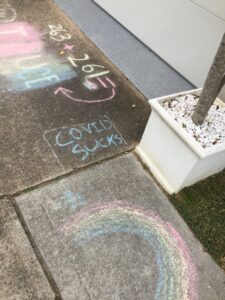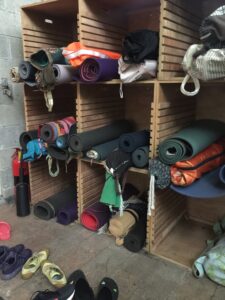My experience as a digital citizen
When I graduated from university in 2011 and started working in an office environment, I became comfortable and used to working from a laptop basically everywhere. That was the start of being attached to an internet connection, laptop and multiple systems and programs. Back then, working remotely was rare and not the preferred method by anyone. Compared to the current post-pandemic era we’re living in, the whole world has done a 180-degree. Now when I think back, I purchased my first smartphone (iPhone 3) in 2012. Now I manage my whole life via smartphone; besides the basic usage (text, calls) I check routes, manage emails, and multiple social media accounts, and meet colleagues and friends via video calls, I even prefer to see my GP via video call – how quick and easy and no need to drive anywhere!

Nowadays I work nearly 100% remotely. It’s cost/time effective and suits my personality perfectly. The pandemic in 2020-2021 changed the method of working within my field (professional specialist). In my opinion, it is a great chance to utilize technology in such an effective way, to boost innovation and have created rapidly new technology f.e in health care, pharmacy and sustainable energy requirements. Can you even imagine, I used to fly all over Europe to visit conferences, meetings and seminars! Now, these events are much rare but can be justified from a networking, innovation and research point of view.
Since the pandemic has slowed down and life has gone back to normal in most countries, I think remote work will still be a common procedure. Cities, such as Sydney in Australia where I used to live in, have had huge issues accommodating all companies, their offices and employees in the CBD area. But since 2020, for the first time ever, there have been empty spaces and people have moved along the coast to have more space, better access to nature and work at least partially from home. In my experience, this is an ongoing trend and gives huge savings to companies as no more highly-priced office spaces with views are needed. The company I worked in, quickly altered its main office to serve a hybrid model of working. What it meant, was that anyone could book a desk for a day from the office, only your own working device was required to bring in for the day. The hybrid model gives so much flexibility and is also a social gain as we got to know people from multiple branches and teams. Since returning to Finland start of this year, my employer has a rough 40% requirement to be present in the main office.
Video sources
I watched/listened to videos and read related articles on the course’s main topics; Big Data & IoT, Cyber Security, Data protection reform and Future Visions. I found them interesting, especially Bid Data & IoT and Cyber Security are now in demand more than ever. Some of the ideas in Future Visions were a bit outdated, yet no one was able to know back in 2011 & 2013 (when the videos were published) that a global pandemic will hit the entire globe and change everything. TED lecture from Chief Economist Marco Annunziata “Welcome to the age of the industrial internet” had many interesting points to it; how to utilize big data and the Internet of Things (IoT) within health care and energy power plants to mention a few. The topic reminded me of Australia where distances from the main cities to remote outback areas can be thousands of kilometres. How do you get medicines, blood samples, and machinery spare parts there in the most cost/time-effective manner? The good old planes do that, but organising everything is a huge task via phone for people and companies in urgent need. This is where IoT and smart technology step in. Drones, smart technology (automatic orders when supplies are below threshold limit) and monitoring / maintaining energy sources (f.e. large-scale solar farms) remotely all are applicable and methods already being used. The video section of “Future Visions” has a great Business Insider article & video from John Hopkins University in the US where drones are tested to be in use to gain quick access to remote areas to collect blood samples.
“Less than 1% of data in businesses is analyzed and turned into benefits.” — SAP
(https://twitter.com/sap/status/652091069031710720 – 8th October, 2015)
The risks of an open digital society
Data is collected everywhere. We are being monitored via our smartphones, watches, apps we use, websites we visit and places we navigate with maps applications just to mention a few. The first question that comes to my mind is where is all of this data stored. Who has access to it? As said in the first chapter of this post, I manage my whole life through my phone. What if hackers break in and steal all my data, or data leaks by accident out to the public? That would mean someone could pretend to be me! They would have all my details – medical records, passports, credit card, banking details, social security numbers etc. And identity thefts do happen every single day. I have friends whose personal details were stolen in Australia due to a property agency that didn’t have a sufficient cyber security plan in use. In the European Union personal data protection is every EU citizen’s fundamental right under EU law which in its primary form is mandatory legislation in each member country. As stated “Article 8 of the EU Charter of Fundamental Rights stipulates that everyone in the EU has the right to:
- the protection of personal data concerning him or her
- access to data which has been collected concerning him or her, and the right to have it rectified” (direct citation from: https://www.consilium.europa.eu/en/policies/data-protection/ , September 2022)
I have not used the right to gain access to the data that has been collected from my life but my colleague did this and found a surprise. Her home address had leaked to a public municipality website due to “human error” made by the municipality officer. She had to request Google to remove the website which they did instantaneously. I think the young and elderly people are the main risk group when comes to data protection as the younger generation has never known life without the internet. The elderly are generally quite easily distracted and could be tricked into spam much easier. Oh well, this is only my personal experience and observation. Yet another risk that comes to mind is that what if one nation would have access to shut down the internet and mess up all power plants, nuclear data, and people’s access? I think the right term is cyber war, and cyber attacks have increased as mentioned often in media.


Self-evaluation
Reflections – what have I learned
In the Digi Society part of this course, I learned more about conceptualizing themes that are part of everyday life now. IoT and big data are everywhere and utilization of AI has started. I reflected especially on the older videos as it was a good way to demonstrate how quickly digital society has evolved. It also created some resistance in me as the overtake of machines and AI is so vast and quick now. I’d rather be in control of my own life but unfortunately, data is collected all the time and we often base our decision on programmed suggestions online. Another thing is the dark side of propaganda that’s being fed to people all over the globe and the attention span has decreased. Many don’t bother to investigate any sources, they rather believe everything that’s being posted on media. I think it’s healthy to take things you read online with a pinch of salt.
Reflections – topics I wish to learn more about in the future
I got more interested in learning more about cyber security and personal data protection. I got thinking about how well data is being protected within the EU, and what about outside of the EU area? When we travel or live overseas – is our data available there? How to be super cautious? In addition, I truly enjoy reading more about AI and innovative companies that might be mainstream in only a few years such as Elon Musk’s Neuralink which is a device that’s implemented in your brain to communicate with computer-programmed devices. To me, it sounds like a science fiction movie but apparently, it’s the next stage of digital human evolution.

Hi!
Oh no! I’m so sorry about what happened to your friend! That sounded very scary. I’m also scared of identity thefts and I think in the social media it’s so easy nowadays that you really need to be careful who you accept as a friend, which links you press and everything. I don’t appreciate this sense of anxiety that it brings along. It should be fun and not having to think about who wants to hurt me or not.
What I also agree is it was crazy to think how much we travelled before covid and at least that’s what I am very positively surprised about our society, on the effectiveness that we found in all teams meetings and everything. Things move forward even though we’re not in the same room. And we can also take care of the earth a bit by. not flying all over the world for small workshops.
Loved your pictures also! Pease can be found in nature!
Hi Lilli,
thank you for your comment! 🙂 I agree with your feedback on how positively technology has impacted our environment – no more unnecessary trips abroad!
And online meetings are fun! I find it quite relaxing to see colleagues at their home offices rather than meeting in a formal board room. It feels like we’re all equals – trying our best, no matter what!
Take care, Riina.